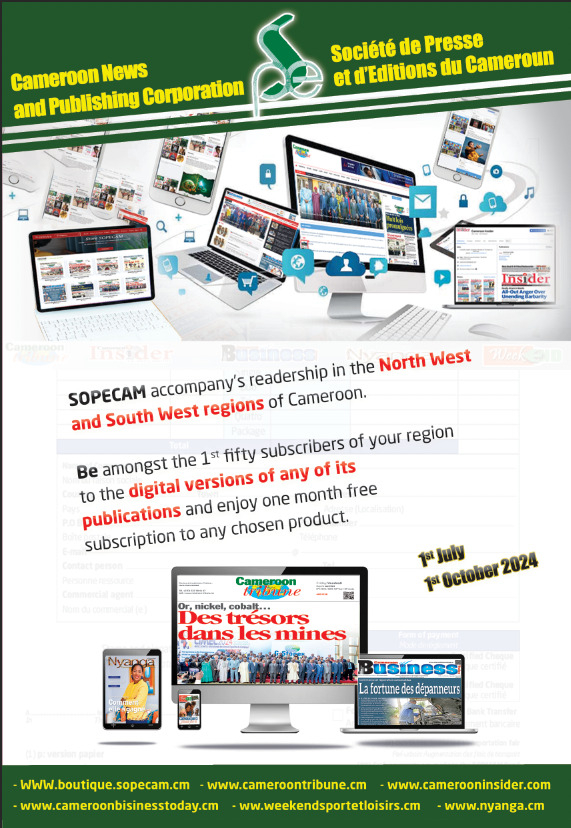News last week of some repentant forest exploiters in Cameroon being trained on gainful use of forest resources may sound benign, yet profound. It immediately points to the inherent contradictions involved in development needs across the country, especially in forest areas, the global discourse on environmental protection, climate change and the local populations being able to survive thanks to what nature has bestowed on them as resources. Ensuring that these concerns fall harmoniously in place has been a problem to most African governments, including Cameroon, its international partners and even the local population.
It has even raised intriguing concerns with some foreign countries making loud-sounding speeches about helping Africa to preserve their forest while those who own the forest argue that they have to use such resources for national development since they are after all less pollutants. Even worse, the same people who ask Africans to protect their forest tend to be the first to tacitly connive with local exploiters to perpetuate some of the excesses recorded in the destruction of forest resources.
Facts about the existing forest resources in the country are even mouth-watery enough to attract both local and foreign exploiters. Sources close to the Ministry of Forestry and Wildlife report that Cameroon has some 22 million hectares of forest land. This counts for some 46 percent of the country’s total surface area. Of the existing forest surface, 26,000 hectares are planted through afforestation efforts. Even more, Cameroon’s forest Law of 1994 presents the woodland of the country in two categories namely the non-permanent estate and the permanent estate. The non-permanent estate is made of community and private forests. The permanent estate comprises of forests reserves, logging concessions, protected areas and council forests, national parks, forest reserves and hunting zones. This ranks the country as second largest in Africa after the Democratic Republic of Congo. Yet, the questions arise as to whether Cameroon is deriving enough gains from its forest. Who, in effect, exploits Cameroon’s forest? Has Cameroon got full control over its woodland? Answers may differ depending on those tackling the isuues.
The forest or woodland is considered a treasure everywhere in the world. Forests are the pearl economically, socially and culturally. As a cultural treasure, inhabitants of forests space derive direct benefits from the plants to include medication from tree-backs, energy for fire, hunting reserve for proteins, wood for construction of homes, material for local bridges, and so their livelihood turns around the forest. This is as far as humans live with their habitat without industrial intervention.
Socially, there is hardly any gathering without the use of wood products. Stools, drums, walking stick, fencing and housing are just a few of the socially listed benefits from forest. Generally, the forest stands out tall as the fountain of wealth. It has been described in policy making circles as the black gold. The importance of forest cannot be over emphasized.
Yet, from observation, the exploitation rate by multinationals holding the licenses is smelling danger if our forest is not sustainably preserved. Over-exploitation would mean scotch-egg cutting of entire forests and not replanting. International bodies are weighing a lot of pressure on African countries to preserve their forests and so delay their use of forest for local development.
Yet, the indigenes in the wood business have very little to say as the real owners of logging companies come from elsewhere and dictate the pace of activities. That smacks of telling developing countries to keep their forests only for them to come and log out when they want. To sit up to the requirements of local development and to protect the forest must be the war to fight. It is the balance to strike. Wood-hungry countries must not use their money to manipulate and lure locals to excessive wood cutting and exporting. Wanton exploitation must be checked but deriving benefits for local development must equally be encouraged.
But how do indigenes exercise checks in an industry they master less? The driving force of control must begin by asking the question whether the communities are deriving benefit from their wood. Such benefit could take the twist of employment. This comes if the wood produced is treated locally. Also, if wood manufacture is done locally. Local benefit is equally noted if the roads leading to forest exploitation areas are standardly maintained. If the bridges crossed ...
Cet article complet est réservé aux abonnés
Déjà abonné ? Identifiez-vous >
Accédez en illimité à Cameroon Tribune Digital à partir de 26250 FCFA
Je M'abonne1 minute suffit pour vous abonner à Cameroon Tribune Digital !
- Votre numéro spécial cameroon-tribune en version numérique
- Des encarts
- Des appels d'offres exclusives
- D'avant-première (accès 24h avant la publication)
- Des éditions consultables sur tous supports (smartphone, tablettes, PC)















Commentaires